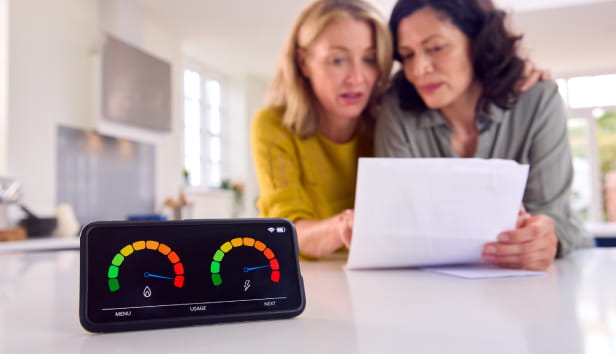This article is for general guidance only and is not financial or professional advice. Any links are for your own information, and do not constitute any form of recommendation by Saga. You should not solely rely on this information to make any decisions, and consider seeking independent professional advice. All figures and information in this article are correct at the time of publishing, but laws, entitlements, tax treatments and allowances may change in the future.
May can feel like a quiet month after the bank holidays and the end of the tax year in April. That means it’s the perfect time to get stuck into some important personal finance jobs that could save you some serious cash over the next 12 months.
Thanks to changes in the energy cap, the renewal of the ISA allowance and the possibility of an early tax refund, if you get through these key tasks early you can save both stress and a good amount of money too.
What’s on this page?
Energy bills are rising, but in general have dropped from highs seen a couple of years ago. Average annual bills are now at £1,849 according to regulator Ofgem’s latest price cap, compared with £1,690 a year ago and £2,500 two years ago. They’re expected to drop from July to September, potentially to £1,712.27, according to figures released from energy research firm Cornwall Insight.
Emily Seymour, Energy Editor at the consumer group Which?, says it’s best to avoid taking out a contract longer than 12 months or one with significant exit fees. “With the price cap predicted to drop in July, more competitive fixed deals may become available in the coming months,” she adds.
Choosing a fixed-rate deal or waiting until later in the year is a tricky decision, as price rises and falls are still only predicted. Locking in now can give you more control over your household spending, and will avoid being hit by unexpected rises in costs.
Being aware of how your monthly usage alters over the course of the year is a smart piece of information to arm yourself with in May, and will make selecting a new deal easier if you decide to wait before fixing.
You may want to consider a smart meter to understand your energy use. We explain here how a smart meter could help you save money.
If you’re on a standard variable tariff, as many households are, it’s a good idea to check out different energy providers to see if you’re on the best deal. Using a comparison website such as uSwitch, Which? or MoneySuperMarket will give you a good sense of what’s on offer. Always check as many as you can, as sometimes different platforms will have exclusive deals.
If you do choose a fixed-price deal now, look out for tariffs that pledge to lower their charges when the price cap drops. And make sure to watch out for energy scams.
You may have scrambled to top up your ISA last month ahead of the end of the new tax year. You can avoid the last-minute rush by paying into your ISA this month – and make more money in doing so. You may even choose to max out your ISA, if you can afford to. The maximum you can pay into ISAs is £20,000 per tax year – spread across any you hold.
The benefit of paying into an ISA early in the tax year is that your money has longer to grow through compounding, where your returns start, in turn, generating returns – as long as you leave your money untouched. For example, if you’d put £5,000 into an ISA at the beginning of each tax year since 1999 – instead of the end – you’d now be £19,381 better off, according to figures from AJ Bell, despite investing the same amount overall.
This assumes you invested in a typical global fund. The extra year of investment would mean you’d have £408,589 today rather than £389,208 if you’d waited till the end of the tax year. “That extra year of investment, when compounded over the years, makes an awful lot of difference,” says Laith Khalaf, Head of Investment Analysis at AJ Bell. “The statistics clearly favour early bird ISA investing over doing it last minute.”
If you can’t afford to pay a big lump sum into your ISA right now – whether cash or stocks and shares – you can still get ahead by setting up smaller regular payments each month, rather than waiting for the end of tax year rush.
And the possibility that the cash ISAs allowance will be reduced is another reason to get your money stowed into a cash ISA before any changes are made. Of course, you should only do this if that’s where you want to put your money – and bear in mind that stocks and shares ISAs generate better returns on average than cash over the long term.
Remember that you can now also pay into multiple versions of the same type of ISA in the same tax year. This means you can have a selection of cash ISAs, perhaps mixing some fixed-rate and easy-access options, to give you flexibility over how you manage your money. If you’ve already started to pay into an ISA without doing much research, don’t worry.
There’s now nothing stopping you opening a second (or third or fourth) ISA in the same tax year, whether that’s a cash ISA with a higher interest rate or a stocks and shares ISA with lower charges. You can either have additional ISAs or transfer an existing ISA into a better one.
.jpg?sc=max&mw=800&h=450&la=en&h=731&w=1300&hash=491DFEAA9CDB67C4CDBCBAAAF7682401)
Now might be a good time to check any insurance policies you have – particularly if you’ve got holidays planned for this summer. A third of Britons are unaware of the need to declare pre-existing medical conditions, according to a recent survey of 2,000 adults by travel insurer Staysure.
Failure to disclose these conditions can leave your cover invalid, potentially landing you with a hefty bill for unexpected medical expenses abroad. Even well-managed conditions such as diabetes, high blood pressure, arthritis and angina all need to be declared, as well as any recent GP appointments, hospital visits, symptoms you’ve experienced or medical tests.
If you have more serious health conditions, such as cancer, you might struggle to get affordable travel insurance from mainstream providers. But that shouldn’t stop you jetting off on a relaxing summer break if you’re fit enough to travel – Moneyhelper has a directory of specialist insurance companies that may be able to help.
At the same time, check when your car or home insurance is up for renewal. Rather than sticking with the same provider, shop around using a comparison website. You may be able to get a better price for equivalent cover (but bear in mind that, partly thanks to the recent high inflation figures, car insurance premiums have risen over the last year).
The best time to buy a new insurance policy is about three to four weeks before your current one is due to expire, say comparison websites, as this is when you’ll likely get the cheapest deal, rather than leaving it to the last minute.
As summer approaches you may be thinking about booking a holiday – but how many of us forget to check whether our passport is in date? This may sound obvious, but people are often caught out by the fact that some countries require an expiry date that is at least six months later than your intended departure date.
For travel to most EU countries, your passport must have been issued within 10 years of departure date. Dig it out now and have a quick look. It costs £94.50 to renew your passport online or £107 if you fill in a paper form, and the turnaround time is generally around three weeks.
You can pay extra for a fast-track service. If you’re travelling in Europe, you should also make sure you have a valid UK Global Health Insurance Card (GHIC) - if not, you can apply for one through the NHS.
This lets you access state-funded healthcare on the same basis as if you were a resident in most EU countries (and some other places too). This may mean that you’ll pay for services you wouldn’t in the UK, as different territories have alternative policies in place.
The card is free and lasts for up to five years. Once your application has been approved, you should receive your card within 15 working days. However, the GHIC is not a replacement for travel insurance.
You should still take out a policy for anything that wouldn’t be covered by state medical care – for example, paying to bring you home when unwell or treatment in a private hospital. You may also find that some travel insurance policies won’t be considered valid unless you have a current GHIC.
You may need to file a self-assessment tax return to HMRC each year if you’re self-employed or have income from a range of sources, such as rental or investments. The deadline for filing a self-assessment tax return online is 31 January (or 31 October if you’re submitting a paper return).
But there’s nothing to stop you filing your return now – as the 2024/25 tax year ended on 5 April. Filing your return early means you’ll know well in advance how much tax you owe to HMRC. You won’t have to actually pay it until 31 January, but at least you can be certain how much you’ll owe and have time to set the money aside without a last-minute panic.
Without the clock ticking, you’ll also have more time to make sure you’re making the most of all the reliefs you may be entitled to – all your allowable business expenses, for example, if you’re self-employed.
Robert Salter, Director at accountancy firm Blick Rothenberg, says another benefit of submitting your self-assessment tax return early is that you can receive any potential tax refund as soon as possible – perhaps in May or early June. “In contrast, if you finalise your tax return in January 2025, you probably won’t receive any refund until March or April [that year] – so potentially 10 or 11 months later,” he adds.


We're here to help you make the most with your money. With a rage of financial services designed with over 50s in mind.


Smart meter pros and cons explained, and how to use them. Plus, new rules mean you could get a payout if yours doesn’t work.



.jpg?la=en&h=650&w=1440&hash=FEBF91094F61E0AD5AC94ABFE4DCE4E9)